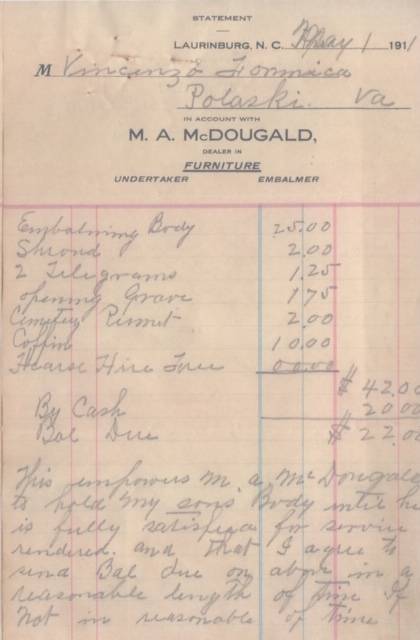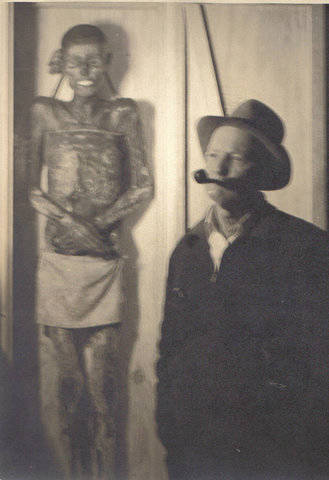LAURINBURG — A well-known story out of Laurinburg is the tale of “Spaghetti.
Spaghetti may not have lived in Scotland County, but he did “stay” in Laurinburg for more than 60 years — after his death.
According to Beachum McDougald, a local historian, Spaghetti’s name was given to him by local residents.
“Locally, the late W. C. ‘Sandy’ Barrett III shared that the locals began calling (Cancetto) Farmica, ‘Spaghetti,’ as anything but a Scottish or Lebanese name in Laurinburg was as foreign to their tongue as collards were to Yankees,” said McDougald.
On Sept. 30, 1972, with a Roman Catholic Priest officiating, Spaghetti was finally buried.
“Covington Concrete arrived and poured two yards of concrete on his burial vault to prevent any grave tampering,” said McDougald.
Spaghetti’s story
In April 1911, a carnival was setting up in a field north of McColl, S.C. The carnival entertainers were also the carnival workers and Farmica, a trumpet player, was helping to prepare one of the large tents.
“It is unknown, exactly, the details, but an argument broke out between Farmica and another worker,” said McDougald. “The 5-foot-tall Farmica was too short to put up much of a fight, so he fled. Unfortunately, he tripped on one of the ropes supporting the tent, and his pursuer, having picked up a baseball bat-sized tent stob (or stake) with a steel head, clubbed the 23-year-old Farmica in the head.
“Unconscious, but still alive with a crushed skull,” continued McDougald, “Farmica was loaded onto a wagon for the nearly 10-mile journey to James Sanatorium, located at the northeast corner of West Church and Atkinson streets in Laurinburg.”
Farmica’s injuries were serious and, on April 28, 1911, he passed away while at James Sanatorium.
The undertaking and furniture business of M.A. McDougald, located at the intersection of Railroad and South Main streets, took possession of the body. John McDougald embalmed Farmica under the instructions of the proprietor of the traveling carnival.
“Cancetto Farmica’s father arrived a few days later from another carnival and made a deposit of $20 on the $42 burial costs and promised to pay the remainder within a few days,” said McDougald. “Nothing else was heard from him, but oral history stated that a request came from his family in Italy. They wanted his body returned to Italy for a proper Roman Catholic burial in Italy.”
The McDougalds reportedly replied with the cost to place his coffin on a train in Laurinburg and shipping it to Wilmington, where it could be placed on a ship bound for Europe with connections to the requested Italian post.
“Once again,” said McDougald, “nothing was heard from the family.”
Farmica’s embalmed body mummified — or dried out — and was hung by a rope across his chest and under his arms in the third-story embalming room at M.A. McDougald.
“Years later it was placed in a constructed box for storage,” said McDougald, “and upon losing the three-story building during the Great Depression, Cancetto Farmica’s body moved to three other locations.”
John McDougald, following the deaths of his two older brothers in 1911 and 1928, was the sole owner of McDougald Funeral Home, as it came to be known after the loss of the furniture business in the Great Depression.
“Papa,’ as I called him, died when I was 4 years old,” said McDougald. “Still, I remember the Lifesaver mints he always gave me and playing with his walking cane.
“As his 10 children shared their stories over the years, he was strict,” continued McDougald, “but also quick with a surprising remark. His wife, the former Ila Beacham, passed when their youngest child was 5 years old, and his oldest daughter became their adoptive mother under his guidance.”
As for Farmica, John gave his word to the father that he would not bury the body until given instructions from the family.
“Papa was a man of his word,” said Beacham McDougald about his grandfather.
Word got out about Spaghetti and soon there was a debate on what should be done with his remains.
A final resting place
“In 1972 a US congressman from New York highlighted the Cancetto Farmica story as racist,” said McDougald. “The pressure and constant telephone calls at all hours of the day and night placed a great pressure on my father, Hewitt McDougald. In a follow-up conversation with the congressman, a promise was made by Rep. Mario Biaggi to pay for the funeral, but no funds were ever received.
“On Sept. 28, 1970, I received a telephone call in my dorm at ECU from my mother asking me to come home the following day,” continued McDougald, “To put the past behind us, Pa decided to bury Cancetto Farmica’s earthly remains. The city of Laurinburg donated a grave space in Hillside Cemetery.”
Over 61 years after his death, Spaghetti was finally laid to rest.
JJ Melton can be reached at jmelton@laurinburgexch.wpenginepowered.com.






